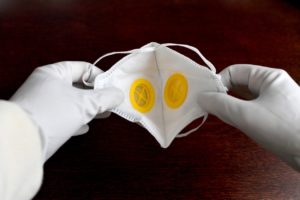Government report recommends more silicosis surveillance and a return to previously monitored patients to reduce risks of the disease
Silicosis should be included as a notifiable disease in the Health Protection (Notification) Regulations 2010 and people who work in at-risk industries should be under health surveillance in GP surgeries, a government body has said.
These are two of the recommendations made by the All-Party Parliamentary Group (APPG) on Respiratory Health, which has released its latest report this month.
Silicosis, the most common chronic occupational lung disease worldwide, is a particular risk for people who work in construction and demolition, stone masonry and stone cutting (especially sandstone), mining and quarrying, worktop manufacturing and fitting, sand blasting, pottery, ceramics and glass manufacturing industries.
The government group recommended in the report that anyone who has previously been monitored for respirable crystalline silica (RCS) exposure, but their checks have been discontinued as they changed employment, should be further investigated for possible symptoms at health check ups and appointments.

 It also said GP patient records should record if a person has been subject to health surveillance due to exposure to silicosis and notification of previous RCS exposure should be made at lung health checks.The report is a follow up to the initial ‘Silica – The Next Asbestos’ report in 2020 and this time focused on risk reduction strategies that can play a key role in decreasing exposure and ill health, reducing the burden on healthcare services and helping to save lives.
It also said GP patient records should record if a person has been subject to health surveillance due to exposure to silicosis and notification of previous RCS exposure should be made at lung health checks.The report is a follow up to the initial ‘Silica – The Next Asbestos’ report in 2020 and this time focused on risk reduction strategies that can play a key role in decreasing exposure and ill health, reducing the burden on healthcare services and helping to save lives.
Silicosis is a form of pneumoconiosis and is a progressive, degenerative clinical respiratory condition which causes crippling health conditions and co-morbidities and can lead to death.
It is caused by Silica (Silicon dioxide), which is found naturally around the world in the form of minerals including quartz, tridymite and cristobalite.
Arco, a UK safety company, provided testimony to the APPG investigation in both 2020 and 2023 into the dangers of exposure to silica.
The company has urged the government to act on the recommendations made to help save lives. It provided evidence on better prevention by following the hierarchy of control, eliminating, substituting, isolating or introducing engineering controls to extract crystalline silica from the manufacturing and construction process.
Arco also stated that dust monitoring is vital, referencing advances in technology that provide real-time exposure level monitoring. Arco believes that without real-time monitoring, it is impossible to prove that exposure levels are within the Worker Exposure Levels (WEL).
Arco has welcomed the inquiry’s recommendations and would like to see increased education and awareness of the risk of exposure to silica dust through compulsory modules in construction industry apprenticeship training and further education courses.
Kevin Williams, Arco’s Respiratory Manager, said: “We all know that respiratory illness can cause serious health problems, disability and even death to those exposed unnecessarily to risks, such as silica dust.
“We also know that these risks are often preventable and we are pleased to have contributed to the work of the APPG on Respiratory Health in this follow up report.
“We urge the Government to act on the findings so that we can work together with our industry partners and regulators to help reduce the risks for those working in some of our most critical industries.”
[vc_row][vc_column width="2/3"][vc_column_text]
What makes us susceptible to burnout?
In this episode of the Safety & Health Podcast, ‘Burnout, stress and being human’, Heather Beach is joined by Stacy Thomson to discuss burnout, perfectionism and how to deal with burnout as an individual, as management and as an organisation.We provide an insight on how to tackle burnout and why mental health is such a taboo subject, particularly in the workplace.[/vc_column_text][/vc_column][vc_column width="1/3"][vc_single_image image="70883" img_size="medium" onclick="custom_link" link="https://www.shponline.co.uk/working-at-height-3/barbour-download-guide-to-working-at-height/"][/vc_column][/vc_row][vc_row][vc_column][vc_btn title="Listen now!" color="success" link="url:https%3A%2F%2Fwww.shponline.co.uk%2Fpodcasts%2Fwhat-makes-us-susceptible-to-burnout%2F|target:_blank"][/vc_column][/vc_row]
Government report recommends more silicosis surveillance and a return to previously monitored patients to reduce risks of the disease
Silicosis should be included as a notifiable disease in the Health Protection (Notification) Regulations 2010 and people who work in at-risk industries should be under health surveillance in GP surgeries, a government body has said.
Safety & Health Practitioner
SHP - Health and Safety News, Legislation, PPE, CPD and Resources Related Topics
Metalworking fluids: Most businesses inspected ‘not doing enough’ to protect workers
SHP’s most-read articles of 2023
Legionella risk in RAAC affected buildings
